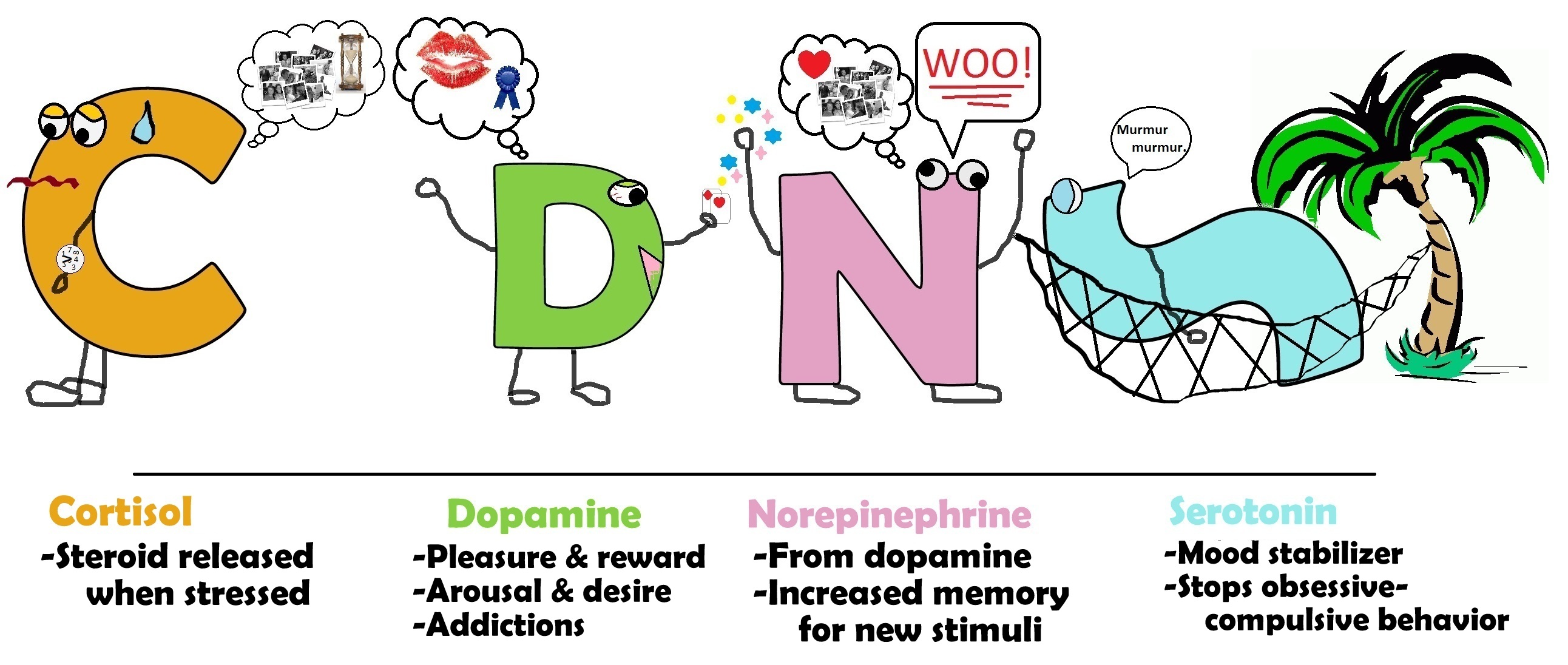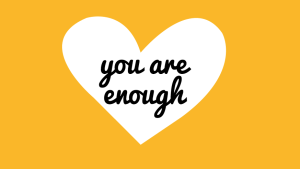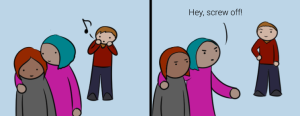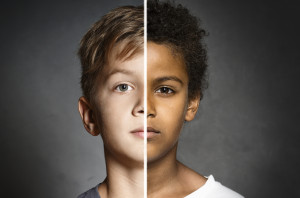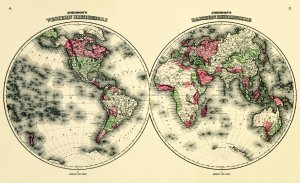
Credit: Nicki Dobrin
Ah, love.
Butterflies in your stomach. Bordering-on-dangerous heart palpitations. The way that your breath seems to be stolen, floating away and leaving you with a sense of euphoria, whenever you meet the gaze of your crush from across the room.
It’s a beautiful feeling, falling in love is. It causes us to daydream, to wake up happy, to end every tweet with #foreveralone when we feel unwanted and dejected.
And it also causes us to act in some really bizarre ways.
But why?
We live in a society where every fiber of a woman’s being – from her curves to her feelings – is analyzed and scrutinized. We’re told – by the media, by our families, by our friends – how we should feel, how we should act, how we should be.
And when it comes to love, we’re expected to be searching for a mate constantly. But we’re also told that we’re crazy when we fall head over heels, and we’re chastised when we don’t recognize the abusive qualities in others, when love is blind.
Sometimes it feels like we just can’t win. We look in the mirror – even us feminists! – wondering what’s wrong with us, why we’re doing what we’re doing, how we could be so stupid as to let love control our entire lives.
But part of being a feminist – nay, part of being a complete person – means understanding our feelings and recognizing their normalcy.
We preach so often the importance of understanding and accepting our bodies, but sometimes we forget that that applies to our minds and our hearts as well.
So let’s explain love. Let’s explain that fervor. Because we deserve full comprehension and control of our bodies.
And when we do, we are more able to be at full choice about how to act regardless of what our bodies are experiencing. Instead of being driven by our body’s reactions, we can see them as just hormones flowing through our bodies – and not as the undeniable truth!
So let’s focus on our brains – our hypothalamus, to be exact – forgetting about our hearts for a second and letting neurobiology explain our experiences to ourselves.
Now, in order to understand brain chemistry, first we need to understand the chemicals involved. It must be noted here that this article aims to be an introduction to these concepts – and as such will be dramatically oversimplified. There is a lot more to neurobiology than this, but here is a start.
Above is a totally weird representation that I made of four hormones that are important to understanding love. In the most basic sense:
- Cortisol is a stress hormone
- Dopamine seeks out pleasure
- Norepinephrine makes you highly excitable
- Serotonin is a mood stabilizer
When you’ve got a crush, your serotonin drops as your cortisol increases, which makes your brain pump out dopamine, which produces norepinephrine.
In other words, when you’re in the process of falling for someone, all of the hormones that make you anxious and energetic are high, and the one that keeps you stable is low. Do you see where I’m going with this?
When Helen Fisher – an anthropologist and human behavior researcher – was doing work on which commonly-reported feelings, thoughts, and behaviors were (cross-culturally!) associated with falling in love, she came up with a list of almost twenty. Aggrandizing. Mood swings. Jealousy. Constantly searching for clues to piece together what exactly he meant when he said “have a nice day.” Those are all on the list.
But, in the interest of saving time (and holding your attention), I chose five of them to expand upon and explain using neurobiology.
You never have to wonder why you’re up at four o’clock in the morning writing in your diary ever again! Because here’s why:
1. Focused Attention
Tell-Tale Sign: It’s more important tonight to bake her cookies than it is to study for that final tomorrow.
When you have a crush on someone, the levels of dopamine in your body are elevated, causing feelings of both exhilaration and anxiety. See, you can thank dopamine for the way that your heart beats out of your chest and your hand trembles when you try to talk to her.
But those hormones swirling through your body are also associated with focused attention and unwavering motivation, sparking in you the drive to woo someone.
Dopamine – which, by the way, is also associated with addictions – is a pleasure-and-reward-seeking hormone. It wants – nay, it needs – you to complete any task necessary to get the reward that you’re after.
In this case, it’s affection. So even when you have more important things to focus your attention on, your energy will repeatedly turn to her until you are able, in the words of Melissa Etheridge, “to satisfy the hunger, to satiate the need.”
And that addictive quality is why you’ll do it again and again and again.Even if you’re failing class because of it.
2. Intrusive Thinking
Tell-Tale Sign: You stare at your phone, waiting for it to light up with a text message, while fantasizing about your next date.
I was told in Kolkata that the translation of the Bengali concept of having a crush goes something like this: “You are the one thought that crosses my mind more than any other in a day.”
In other vernacular, we call that “obsession,” but that’s exactly what a crush is.
Because when we’re falling for someone, our levels of serotonin drop dramatically. Serotonin, a mood stabilizer, makes you feel calm and in control. And as such, it stops obsessive-compulsive behavior.
But when your mania-causing level of dopamine completely outweighs your level of serotonin, then you have far less control over your obsessive thoughts and behaviors.
It’s why you check your phone constantly. It’s why you can’t stop doodling his name in class. It’s why you’re able to find some really bizarre way to bring up his family trip to Zimbabwe when your roommate asks if you want to order pizza.
It’s also why selective serotonin re-uptake inhibitors (SSRI’s) are prescribed for people with obsessive-compulsive disorder – to modulate dopamine and cortisol levels, effectively diminishing their excitatory effects.
Serotonin forces you to relax. And without it, you’re left to obsess.
3. Change in Priorities
Tell-Tale Sign: Your friends are like, “Since when do you like golf?”
Most of what this has to do with is the aforementioned spike in dopamine, which causes you to try just about a-ny-thing to get the reward that you seek – in this case, the heart of your beloved (uhh, figuratively).
So even if you hated golf before, you might suddenly be totally cool with trying it – or even buying yourself a set of clubs just to prove it!
But another hormone at work here is norepinephrine, which allows for increased memory of new stimuli. That is, all of these short-term emotional events (read: dates) become branded in your mind as very vivid and very, very awesome, thanks to the amount of dopamine surging through you.
So when you do go golfing for the first time and you look back on it later, you’re like, “Holy shit, that was awesome!” And that (somewhat distorted) memory keeps you coming back for more.
But it’s also why these newfound hobbies don’t usually last. Eventually, as your relationship progresses and your hormone levels reach homeostasis, your long-term memory wins out and overpowers all of those newer, more exciting memories.
After all, once you’ve gained the object of your affection (and you know it’s official when you change your Facebook relationship status), those high dopamine levels drop off, and you no longer feel an obsessive, addictive need to please your partner.
4. Intense Increase in Energy
Tell-Tale Sign: Even though you’re usually in bed before ten, you can suddenly stay up until six in the morning to Skype with him, and then actually make it through the next day.
Where does that energy come from? Well, not to put too fine a point on it: norepinephrine.
Dopamine – which, remember, increases when you feel desire and arousal for someone – produces norepinephrine, which is associated with feelings of excessive energy and sleeplessness.
It’s like an adrenaline rush of caffeine running straight through your veins (or—well—your central nervous system), giving you the ability to stay up all hours of the night and then to make it through work the next day.
Oh, and that dopey feeling of oh-my-God-it-was-so-worth-it-though the next morning when your alarm goes off? You’ve got dopamine to thank for that. It drove you to seek a reward, and when you reached it and reaped the benefits, the need was satiated.
But that addictive feeling is also why you’ll do it again, despite knowing better. That is, your brain’s frontal lobes – which are associated with responsible, consequence-driven decision-making – will bow to the almighty mid-brain function of instinctive drive, the same way that you manage to eat an entire cheesecake before realizing what a mistake it was (or is that just me?).
5. Heightened Passion in the Face of Adversity
Tell-Tale Sign: He shows up under your balcony comparing you to the sun, and you love it, even though you know your parents will kill you if they find out.
The truth of the matter is: the riskier the situation, the higher the likelihood that you’ll fall for one another. And that’s because an increase in cortisol, which is released when you’re stressed out, begets an increase in dopamine.
So when you’re sneaking around with your best friend’s partner or your boss, for instance, the stress of getting caught eventually translates into child-like excitement, literally causing that gravitational pull that we too-often use as an excuse for bad behavior.
The more your cortisol is raised, the more your dopamine is raised, and the more your dopamine is raised, the more you crave satiation and become addicted to your crush. It’s quite the cycle.
But you can use it to your advantage, too. Got your eye on someone, and she finally said yes to a first date? Take her hiking or to a scary movie. Her cortisol will spike from the associated anxiety, and when her dopamine levels go up, she’ll be more likely to fall for you. Neurobiology is so manipulative.
Now yes – of course – I know. The idea that we can use brain science to explain falling in love is utterly unromantic. “Once upon a time, there was a girl whose brain chemistry was steady, but that was all about to change.” There’s not a single fairy tale that starts off like that.
But it is, perhaps, how real-life love starts. And while that doesn’t at all sound pretty, it does help us understand why we act, feel, and think the way we do while we’re falling in love.
And I can’t think of anything more feminist than having a complete understanding of ourselves – even when we’re in the throes of passion.
Melissa A. Fabello is a Contributing Writer for Everyday Feminism, a feminist blogger and vlogger, as well as an online peer sex educator, based out of Philadelphia. She is a second-year graduate student, working on an M.Ed. in Human Sexuality. She can be reached on Twitter @fyeahmfabello.
Search our 3000+ articles!
Read our articles about:
Our online racial justice training
Used by hundreds of universities, non-profits, and businesses.
Click to learn more


